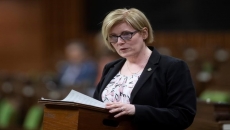Asylum seekers working on the front lines of the COVID-19 crisis are getting an early chance at permanent residency in Canada, but some advocates say the government's plan will leave thousands of workers on the sidelines.
Immigration Minister Marco Mendicino announced the program Friday in response to public demand that the so-called "Guardian Angels" — many in Quebec — be recognized for their work in the health-care sector during the pandemic.
Ordinarily, asylum seekers must wait for their claims to be accepted before they can become permanent residents, but the new program waives that requirement.
To apply for residency now, they must have claimed asylum in Canada prior to March 13 and have spent no less than 120 hours working as an orderly, nurse or another designated occupation between the date of their claim and Aug. 14.
Applicants must also demonstrate they have six months of experience in the profession before they can receive permanent residency and have until the end of this month to meet that requirement.
In an interview Friday, Mendicino called the announcement historic, and a reflection of the fact asylum claimants put themselves at risk to contribute day-after-day on the front lines, in hospitals and in retirement homes, even without permanent status in Canada.
"They demonstrated a uniquely Canadian quality in that they were looking out for others and so that is why is today is so special," he said.
The new program was the result of negotiations between the federal government and Quebec, who have had a strained relationship on the question of immigration, and in particular the asylum claimants, in recent years.
Quebec has housed many of the nearly 60,000 people who requested asylum in Canada after crossing on foot into the country from the U.S., the majority using an entry point in Quebec called Roxham Road.
The provincial government had long called for Ottawa to do more to stem the flow of people and also increase financial support to Quebec to deal with the new arrivals and the pressures they were placing on local resources.
But during the height of the COVID-19 crisis, when it emerged that refugee claimants were among those toiling in Quebec's hard-hit long-term care facilities, public support began to build in favour of granting them special residency status.
Frantz Andre, a Haitian community organizer in Montreal who advocates on behalf of asylum seekers, said he had received calls from many people expressing relief that they now have a path to permanent status.
"I'm very happy with the decision the government took because it provides a lot of relief and comfort," Andre said in an interview.
But, he said, the government's plan is bittersweet because many front-line workers are still ineligible for regularization. "We're not giving up yet," Andre said. "We're hoping we can influence the federal government and Quebec that they should enlarge their program."
That was echoed by Wilner Cayo, president of Debout pour la dignite, a Montreal group that has pushed for the federal government to grant permanent status to all asylum seekers working on the front lines.
Cayo said Ottawa's plan excludes thousands of asylum seekers whose jobs were deemed "essential" during the pandemic, such as cooks or security guards in Quebec's long-term care homes, as well as labourers on farms and at food processing plants.
"We're treating these workers like disposable products," Cayo said in an interview. "Yes, we salute this first step in the right direction, but we are profoundly shocked by these workers who are deemed essential but are left on the sidelines."
Quebec Premier Francois Legault said earlier this year that while he was grateful for the asylum seekers' work, he was concerned that granting them fast-tracked residency status would encourage even more people to cross the border.
Speaking to reporters in Chibougamau, Que., Friday morning, Legault said he did not know how many asylum seekers would be eligible for the regularization program. But, he said, he was happy his government could come to an agreement with Ottawa.
"I'm happy to see the Quebec and federal governments work together for asylum seekers (who) took risks by working in the health-care system during the pandemic," Legault said. "To thank them, we'll accept them as immigrants."
At the news conference in Montreal, Mendicino said the Quebec government was a positive force in putting together the agreement.
He said efforts were made to allow as many people as possible apply, and there is still some flexibility in the criteria, especially if people weren't able to work the required number of hours because they contracted COVID-19.
But Mendicino said the program was designed with strict parameters limiting who is eligible. "This is about recognizing an exceptional contribution during a very exceptional period of time and we feel that will come across very clearly," he told The Canadian Press.
Exactly how many people would benefit from the program is unclear. Some reports have suggested at least 1,000 people could qualify.
The asylum seekers entered Canada at unofficial border points to get around a deal between Canada and the U.S. called the Safe Third Country Agreement.
Under the agreement, which took effect in 2004, Canada and the U.S. recognize each other as safe places to seek protection. It means Canada can turn back potential refugees who arrive at land ports of entry along the Canada-U.S. border on the basis they must pursue their claims in the U.S., the country where they first arrived.
A federal judge in July, however, struck down that agreement and gave Canada six months to change it before it becomes invalid.
Mendicino said the government is still reviewing the ruling. He pointed out the border is currently closed to most asylum seekers, under restrictions designed to limit the spread of COVID-19.






